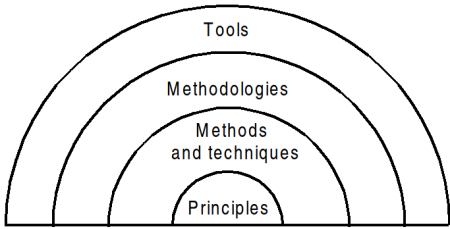Principles of Software Engineering
Mithat Konar
July 24, 2012
Adapted from
 Ghezzi, Carlo, Mehdi Jazayeri, and Dino Mandrioli. “Software Engineering Principles.” In Fundamentals of Software Engineering. 2nd ed. Upper Saddle River, N.J.: Prentice Hall, 2003. 41-66.
Ghezzi, Carlo, Mehdi Jazayeri, and Dino Mandrioli. “Software Engineering Principles.” In Fundamentals of Software Engineering. 2nd ed. Upper Saddle River, N.J.: Prentice Hall, 2003. 41-66.
Introduction
- Motivation
- Most real-world problems are:
- Complex, difficult to decompose
- Involve a number of developers and other shareholders
- Evolve over time
- Software engineering attempts to provide developers with strategies to manage this.
- “How do you build big projects?”
Introduction
- Product: “What it is,” and “The code you write.”
- Process: How you got there
- Both are important
The principles
- Rigor and formality
- Separation of concerns
- Modularity
- Abstraction
- Anticipation of change
- Generality
- Incremantality
The principles
- Rigor and formality
- Separation of concerns
- Modularity
- Abstraction
- Anticipation of change
- Generality
- Incremantality
Rigor and formality
- rigor: the quality or state of being very exact, careful, or strict.2
- formality: the highest degree of rigor
- Often based on mathematical/logical laws
- Different projects/parts require more or less rigor/formality
- High criticality → high rigor/formality
- Tools include natural language, formal languages
Rigor and formality
- Impacts software qualities of:
- reliability
- verifiability
- maintainability
- reusability
- portability
- understandability
- interoperability
- reusability
The principles
- Rigor and formality
- Separation of concerns
- Modularity
- Abstraction
- Anticipation of change
- Generality
- Incremantality
Separation of concerns
- Features and responsibilities should overlap as little as possible
- Minimizes interdependence
- Increases resusabilty
- Can be applied to product and process
- Example: A lamp is not a toaster.
- Changing a light bulb doesn't break toasting.
- If you need a lamp someplace, you don't have to get a toaster as well.
Separation of concerns
- Another example: the Web
- “Web 2.0+”:
- Content/semantics: XHTML
- Presentation: CSS
- Behavior: Javascript
The principles
- Rigor and formality
- Separation of concerns
- Modularity
- Abstraction
- Anticipation of change
- Generality
- Incremantality
Modularity
- Division of the system into smaller modules
- Decomposition: recursively subdividing the system
- “Divide and conquer”
- top-down
- Composition: building up from completed parts
- Legos
- bottom up
Modularity
- Benefits:
- Facilitates separation of concerns
- Supports anticipation of change
- Enhances quality of understandability
The principles
- Rigor and formality
- Separation of concerns
- Modularity
- Abstraction
- Anticipation of change
- Generality
- Incremantality
Abstraction
- In general use: considering something “apart from application to or association with a particular instance.”3
- In S/W Engineering: wrapping a concept such that it:
- Expresses the concept only in terms of what is relevant
- Shields the user from everything that's not relevant
- (i.e., building models)
- Examples:
- What is a ball?
- Functions
Abstraction
- Humans are powerful abstractors.
- Abstraction is at the heart of computing.
- Applied to:
- Hardware
- Programming languages
- Program design
- Programming process
- …
The principles
- Rigor and formality
- Separation of concerns
- Modularity
- Abstraction
- Anticipation of change
- Generality
- Incremantality
Anticipation of change
- Almost all development projects change
- while the project is being developed,
- after release.
- Process and code should be designed to support evolution.
The principles
- Rigor and formality
- Separation of concerns
- Modularity
- Abstraction
- Anticipation of change
- Generality
- Incremantality
Generality
- Often, a problem you work on is a more specific version of a more general problem.
- Work with solution based on more general problem
- If you need to invent an oxcart wheel:
- Invent a wheel and then use that to build the oxcart wheel.
- Don't re-invent the wheel in the first place.
- General problem might be easier to solve (or not).
- Supports quality of reuse
The principles
- Rigor and formality
- Separation of concerns
- Modularity
- Abstraction
- Anticipation of change
- Generality
- Incremantality
Incremantality
- A journey of a thousand miles begins with a single step. —Lao-tzu mistranslation4
- Development proceeds in a stepwise fashion (i.e., in increments).
- “Iterative refinement”
- Deliver subsets of a system early to get early feedback
- Deliver prototype of the system and incrementally add effort to turn it into product
- Implement functionality, then tune performance
- Supports anticipation of change
- Example: Adium's commit history
Concluding remarks
- Different methodologies emphasize different combinations of principles.
- Conflicts among principles may arise.
- Software engineering is:
- a new field and subject to change.
- made by humans for humans.
- Your contemplations and contributions are crucial.
Endnotes
1Ghezzi, Carlo, Mehdi Jazayeri, and Dino Mandrioli. “Software Engineering Principles.” In Fundamentals of Software Engineering. 2nd ed. Upper Saddle River, N.J.: Prentice Hall, 2003. 42.
2“Merriam-Webster's Learner's Dictionary.” Merriam-Webster's Learner's Dictionary. http://www.learnersdictionary.com/search/rigor (accessed July 23, 2012).
Endnotes
3“Abstracting - Definition and More from the Free Merriam-Webster Dictionary.” Dictionary and Thesaurus - Merriam-Webster Online. http://www.merriam-webster.com/dictionary/abstracting?show=0&t=1343046707 (accessed July 23, 2012).
4“Quote Details: Lao-tzu: A journey of a… - The Quotations Page.” Quotes and Famous Sayings - The Quotations Page. http://www.quotationspage.com/quote/24004.html (accessed July 23, 2012).
~
Copyright ©2012 Mithat Konar
